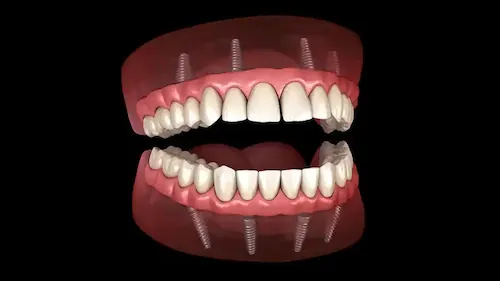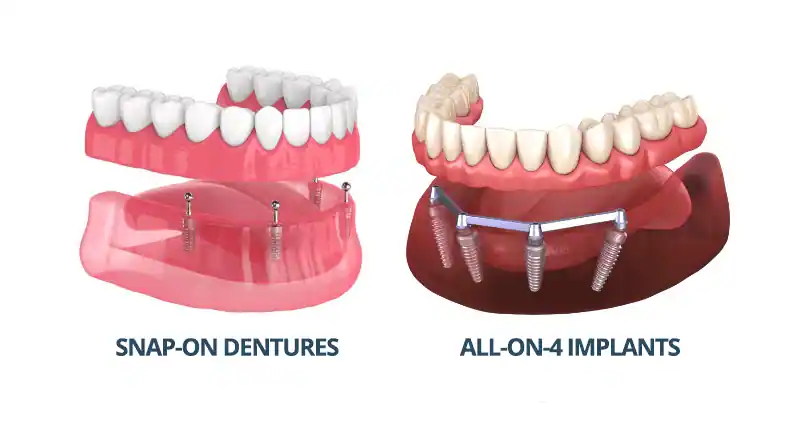If you have a significant number of missing teeth, you’re probably aware of the problems it can cause with your smile’s appearance. It can also make speaking and eating properly more challenging compared to when you had a full set of teeth.
Fortunately, there are highly effective solutions available to address these issues and restore your smile to its natural look.
When it comes to replacing missing teeth, the two most effective treatments are all-on-4 dental implants and dentures. Choosing between these options can be a difficult decision. To help you make an informed choice, let’s take a detailed look at the differences between all-on-4 dental implants and dentures.
We’ll explore factors such as costs, benefits, and time requirements.
All-On-4 Dental Implants Vs. Dentures: A Comprehensive Comparison
When it comes to choosing between all-on-4 dental implants and dentures, it’s essential to have a clear understanding of how these treatments work, as they offer similar results. To make an informed decision regarding whether to opt for implants or dentures, it’s important to explore all the aspects of these treatment options.
All-On-4 Dental Implants: A Solution for Replacing an Entire Row of Teeth
If you’re missing a complete row of teeth, all-on-4 dental implants offer a remarkable option to restore your smile. Unlike traditional dental implants, which are individual artificial tooth roots, all-on-4 implants utilize only four implants to support an entire row of teeth.
These implants are typically made from titanium, a durable material known for its compatibility with the human body.
The all-on-4 implants are securely attached to the jawbone, serving as stable anchors for a bridge, crown, or denture that will replace the entire set of missing teeth. What sets all-on-4 implants apart is their strategic placement, allowing for optimal support and functionality.
Due to the fusion of the titanium implants with the jawbone, the implants become a permanent part of your mouth. The chances of needing replacements are rare, unless an implant breaks in the future.

The treatment process begins with a thorough consultation, where your teeth will be evaluated, and a CT scan may be performed to assess the condition of your jawbone.
This step is crucial in determining whether you are a suitable candidate for the treatment, as the health of your jawbone plays a vital role in the success of the procedure.
Implant Placement and Finalizing the Treatment
In cases where your jawbone lacks the necessary health to support implants, alternative treatments may be required. However, if your jawbone is deemed suitable, the next steps in the all-on-4 dental implant process involve creating molds of your upper and lower jaws.
These molds serve as the foundation for crafting a dental bridge that will be used in conjunction with the implants.
On the day of the surgery, you will be administered a mild sedative to ensure a pain-free experience throughout the treatment. The initial surgical procedure involves the extraction of any remaining teeth to make space for the implants.
If there is any infected tissue surrounding these teeth, it will be removed during the surgery as well. Once this phase is complete, the dental implants will be carefully positioned in the correct locations.
Typically, two implants will be placed at the front of your lower jaw, while the remaining two implants will be positioned at the back of the jaw at a 45-degree angle.
Precise implant placement is crucial to provide effective support for the entire set of artificial teeth. After a full recovery from the surgery, the final step involves fitting and adjusting the artificial teeth to ensure a proper fit and optimal comfort for you.
Dentures
Dentures serve as removable replacements for missing teeth, fitting directly over your gums. They consist of artificial teeth attached to an acrylic base designed to resemble your natural gum appearance, ensuring a natural-looking smile.
There are two types of dentures available: full dentures and partial dentures. Full dentures are intended to replace an entire row of teeth. They are fitted in the mouth once all remaining teeth have been extracted and the surrounding tissues have healed properly.
It’s important to note that the healing process after tooth extraction may take several months, during which you can expect to be without teeth.
On the other hand, partial dentures are suitable for replacing a small number of missing teeth. They are connected to a metal framework and serve as an alternative to dental bridges. The key distinction is that dentures are removable, providing flexibility and convenience in their usage.
Treatment Duration: All-On-4 Dental Implants Vs. Dentures
Both all-on-4 dental implants and dentures involve a significant duration of treatment. For dentures, the process begins with the removal of any remaining teeth to make way for the dentures. Following tooth extraction, the gums need time to heal properly, which typically takes around 3-6 months.
During this healing period, regular checkups with dentists are necessary to monitor the progress of gum and tissue healing. While dentures can be placed immediately after tooth extraction, further adjustments are often required once the swelling subsides, which can be inconvenient for some individuals.
In the case of all-on-4 dental implants, the treatment timeline involves a preparation phase lasting 4-8 weeks. Subsequently, a surgical procedure is performed to remove the teeth, and temporary acrylic teeth are provided as an interim solution. The implants are left in the gums for approximately six months to ensure proper healing and prevent infections.
Once the gums have fully healed, the final dentures for the all-on-4 treatment are fabricated, which can take around two months. While the all-on-4 treatment process is lengthier compared to standard dentures, it offers a permanent solution for missing teeth, in contrast to the temporary nature of dentures.
Benefits of All-on-4 Dental Implants Compared to Dentures
Both dentures and all-on-4 dental implants offer various advantages, but many consider all-on-4 implants to be the superior option for tooth replacement. Dentures provide an immediate boost in confidence and quality of life, as they restore a full smile.
Dentures are also cost-effective, especially when replacing a small number of teeth. Partial dentures can save you a significant amount of money. While not as durable as all-on-4 dental implants, well-maintained dentures can last up to 10 years.
However, the all-on-4 treatment is an excellent alternative to dentures. The artificial teeth in all-on-4 implants can be cleaned just like natural teeth. As they are securely attached to durable implants, there are no additional oral care requirements compared to dentures.
Unlike traditional dentures that need to be removed at night, all-on-4 implants are permanent replacements, eliminating this inconvenience. The permanent nature of all-on-4 implants means you don’t have to worry about damaging your teeth while eating.
Moreover, dentures require additional cleaning tools, such as adhesives and special cleaning solutions, which incur extra costs. Dentures need to be soaked overnight in the cleaning solution and extensively cleaned before wearing them, which can be time-consuming. In contrast, all-on-4 implants can be brushed and flossed using the same methods as natural teeth.
All-on-4 implants also contribute to better jawbone health compared to dentures, helping to slow down the progression of jawbone loss. The most notable benefit of all-on-4 dental implants is their superior comfort.
Dentures rest directly on the gums, which can lead to ongoing discomfort and mouth sores. In contrast, all-on-4 implants are securely fixed in the mouth and should never cause discomfort.
Cost Comparison: All-On-4 Dental Implants vs. Dentures (as of May 2023)
When comparing the costs of these treatments, it’s important to consider the long-lasting nature of all-on-4 dental implants compared to dentures. While dentures are generally more affordable, the permanence of all-on-4 implants makes them a cost-effective solution in the long run.
In Denver, partial dentures typically range from $2,000 to $4,000, while full dentures can cost between $8,000 and $10,000 per row.
On the other hand, the costs of all-on-4 dental implants can vary based on individual factors. Generally, the price for each row of implants ranges from $20,000 to $50,000, with most falling below $45,000.
To better understand the cost, it’s helpful to consider the price of a single implant, which is typically around $3,000 to $3,500. If you need to replace multiple teeth (10-15) on each row, the all-on-4 treatment can be more cost-effective compared to individual tooth replacements.
Here at Dental & Implant Centers Of Colorado, we offer various financing options with affordable monthly payments, making the all-on-4 treatment accessible to those who initially thought it might be out of reach.
While dentures have a lower upfront cost, it’s important to note that all-on-4 dental implants offer unique benefits that outweigh those of dentures. These implants provide a natural-looking smile, which is a significant advantage not found in other solutions.
At Dental & Implant Centers Of Colorado, we prioritize providing you with the best treatment options available. Contact our offices to schedule your free dental consultation, where we will help you explore the options that fit within your budget and meet your specific needs.





